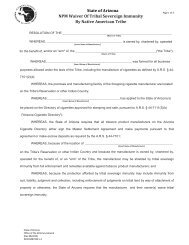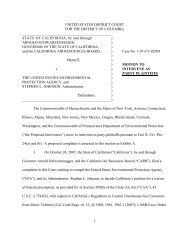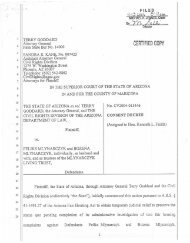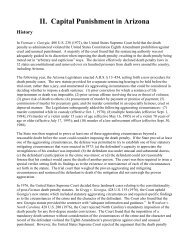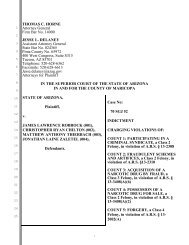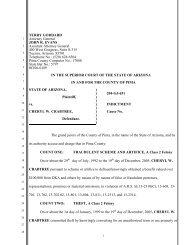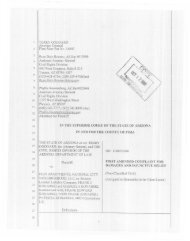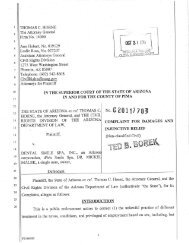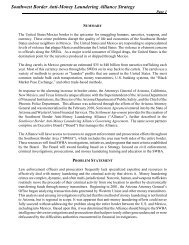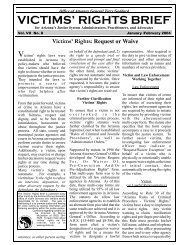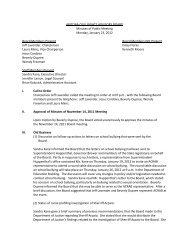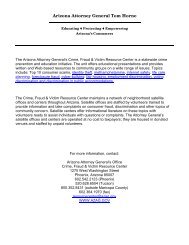Public Officers and Employees - Arizona Attorney General
Public Officers and Employees - Arizona Attorney General
Public Officers and Employees - Arizona Attorney General
You also want an ePaper? Increase the reach of your titles
YUMPU automatically turns print PDFs into web optimized ePapers that Google loves.
Section 2.13Section 2.14Section 2.15Compensation <strong>and</strong> SalariesThe Sunset LawSelected Criminal <strong>and</strong> Civil Liability ProvisionsRevised 2011
CHAPTER 2PUBLIC OFFICERS AND EMPLOYEES2.1 Scope of this Chapter. This Chapter discusses the qualifications, duties,<strong>and</strong> responsibilities of public officers. Selected constitutional <strong>and</strong> statutory provisionsconcerning appointment, tenure in office, <strong>and</strong> civil or criminal liability are also discussed.See also Chapter 3 (Personnel).2.2 Definition. A "public officer" is "the incumbent of any office, member of anyboard or commission, or his deputy or assistant exercising the powers <strong>and</strong> duties of theofficer, other than clerks or mere employees of the officer." A.R.S. § 38-101(3). Theexecutive heads of all state agencies <strong>and</strong> the members of all state boards <strong>and</strong>commissions are considered "public officers." <strong>General</strong>ly, all others working for the stateare “employees.”2.3 Qualifications for <strong>Public</strong> Office. Persons seeking election to public officemust meet <strong>Arizona</strong> constitutional <strong>and</strong> statutory requirements. A person is not eligible forelective State office unless he or she is a qualified elector of the political division ormunicipality in which such person is elected. Ariz. Const. art. VII, § 15. A person who isadjudicated an incapacitated person is not a qualified elector, nor is any person convictedof treason or of a felony, unless restored to civil rights. Id. § 2(c).<strong>Public</strong> officers, whether elected or appointed, must be at least eighteen years old,United States citizens, <strong>and</strong> residents of <strong>Arizona</strong>, <strong>and</strong> must have registered with theselective service system if required by law to do so. A.R.S. §§ 38-201(A), (D), (E). Inaddition, constitutional or statutory provisions establish other specific qualifications forcertain public officers. See, e.g., Ariz. Const. art. V, §§ 1, 2 (age <strong>and</strong> residencyrequirements for the Governor, Secretary of State, State Treasurer, <strong>Attorney</strong> <strong>General</strong>, <strong>and</strong>Superintendent of <strong>Public</strong> Instruction).2.4 Duties <strong>and</strong> Responsibilities of <strong>Public</strong> <strong>Officers</strong>. <strong>Public</strong> officers mustimpartially execute all laws <strong>and</strong> rules for which they are responsible. The <strong>Arizona</strong> SupremeCourt stated in Button v. Nevin, 44 Ariz. 247, 257, 36 P.2d 568, 571 (1934):<strong>Public</strong> officials may not violate the plain terms of a statutebecause in their opinion better results will be attained bydoing so. They have but one duty, <strong>and</strong> that is to enforcethe law as it is written, <strong>and</strong>, if the effect of their action isdisastrous, the responsibility is upon the Legislature <strong>and</strong>not upon them.2−1 Revised 2011
<strong>Public</strong> officers, therefore, must familiarize themselves with laws <strong>and</strong> rules relating generallyto the duties <strong>and</strong> responsibilities of public officers as well as those pertaining to theirparticular offices <strong>and</strong> agencies. <strong>Public</strong> officers are obligated to discharge the duties of theiroffices <strong>and</strong> may not delegate those duties to subordinates unless authorized by law. SeeSection 2.12. See Chapter 13 for a discussion of state officer <strong>and</strong> employee liability,immunity, <strong>and</strong> indemnity.2.5 Nomination <strong>and</strong> Appointment of Appointive <strong>Officers</strong>. The method fornomination <strong>and</strong> appointment of appointive officers is usually set forth in the statutespertaining to the office. Certain public officers are appointed by the Governor with theconsent of the Senate, pursuant to A.R.S. § 38-211. Examples of such public officersinclude the Director of Health Services (A.R.S. § 36-102(C)), the State L<strong>and</strong> Commissioner(A.R.S. § 37-131(B)), the Director of Insurance (A.R.S. § 20-141(A)), the Real EstateCommissioner (A.R.S. § 32-2106(A)), the Registrar of Contractors (A.R.S. § 32-1103), <strong>and</strong>the Racing Commissioners, (A.R.S. § 5-102). Some public officers may be appointed bythe Governor with the consent of the Senate, but not pursuant to A.R.S. § 38-211. TheDirector of the Department of Administration (A.R.S. § 41-701(C)) <strong>and</strong> the Director ofEconomic Security (A.R.S. § 41-1952(C)) are examples. Other public officers areappointed by the Governor without senate approval. Examples of such officers include themembers of the Board of Accountancy (A.R.S. § 32-702(B)), the Board of Barbers (A.R.S.§ 32-302(A)), <strong>and</strong> the Board of Cosmetology (A.R.S. § 32-502(A)). <strong>Officers</strong> appointed bythe Governor, or by the Governor with the consent of the Senate, are entitled to receive acommission of authority from the Governor. A.R.S. § 38-221(A).2.5.1 Nomination <strong>and</strong> Appointment of <strong>Officers</strong> Who Are Appointed Pursuantto A.R.S. § 38-211. When a statute provides that an "officer shall be appointed pursuantto [A.R.S. § 38-211], the [G]overnor shall nominate <strong>and</strong> with the consent of the [S]enateappoint such officer as prescribed in [that] section." A.R.S. § 38-211(A).2.5.1.1 Term of Office Begins or Expires or Office Becomes Vacant DuringRegular Session of the Legislature. When a "term of any state office which is appointivepursuant to [A.R.S. § 38-211] expires, begins or becomes vacant during a regularlegislative session, the [G]overnor [must nominate a qualified person during that session]<strong>and</strong> . . . promptly transmit the nomination to the [P]resident of the [S]enate." A.R.S. § 38-211(B). If an office is occupied by an incumbent who is capable of continuing to serve untilthe Senate has consented to a nomination, a nominee shall not assume the duties of theoffice, pending Senate confirmation. Id. "If the incumbent is unable to continue todischarge the duties of office, the nominee shall assume <strong>and</strong> discharge the duties of theoffice pending [S]enate confirmation." Id."If the [S]enate consents to the nomination, the [G]overnor shall then appoint thenominee to serve for the term or, in the case of a vacancy, for the unexpired term in whichthe vacancy occurred." Id. If the Senate rejects a nomination, the Governor shall notappoint the rejected nominee <strong>and</strong> must promptly nominate another qualified person. Id.2−2Revised 2011
If the Senate does not act on a nomination made during the regular session, thenominee may discharge the duties of the office subject to confirmation during the nextlegislative session. Id. In addition, if the Governor fails to nominate a person or theLegislature fails to receive a nomination during the session, for an office that becomesvacant or a term that began or ended during a regular session, the Governor shall appointa nominee after the close of the legislative session to discharge the duties of the officesubject to confirmation during the next legislative session. Id. This provision was added bythe Legislature in 1989 <strong>and</strong> seems to contradict the earlier provision in A.R.S. § 38-211(B)requiring the Governor to nominate a person during the regular session. 1989 Ariz. Sess.Laws Ch. 250, § 4. This amendment, however, has not yet been construed by the <strong>Arizona</strong>courts.2.5.1.2 Term of Office Begins or Expires or Office Becomes Vacant WhileLegislature is Not in Regular Session. "If the term of any state office . . . expires,begins, or becomes vacant . . . when the Legislature is not in regular session, the[G]overnor shall nominate a [qualified] person . . . for such office." A.R.S. § 38-211(C).The nominee shall assume the duties of the office until the Senate either rejects or fails toact on the nomination. Id. The Governor "shall transmit the nomination to the [P]residentof the [S]enate during the first week of the next regular session." Id.2.5.1.3 Tenure of Nominee <strong>and</strong> Officer. A nominee shall not "serve longer thanone year after nomination without [S]enate consent." A.R.S. § 38-211(E). An incumbentwho is re-nominated to the same office is also limited to one year from the date of renominationwithout Senate confirmation. Ariz. Att'y Gen. Op. I00-014. "Every officer whois subject to [Senate] confirmation [under A.R.S. § 38-211] <strong>and</strong> whose term is not fixed bylaw shall hold office at the pleasure of the appointing power." A.R.S. § 38-211(D).2.5.2 Nomination <strong>and</strong> Appointment of Other <strong>Officers</strong>. As previously noted, anumber of officers are to be appointed by the Governor, subject to Senate confirmation,but are not appointed pursuant to A.R.S. § 38-211. A.R.S. § 38-295 provides that theseother appointees’ offices are also covered by the provisions of A.R.S. § 38-211.2.6 Loyalty Oath. In <strong>Arizona</strong>, a loyalty oath is required of officers <strong>and</strong> employeesof all government agencies. A.R.S. § 38-231(E); see Ariz. Att'y Gen. Op. I86-020."[O]fficer or employee" is defined for this purpose as "any person elected, appointed oremployed, either on a part-time or full-time basis, by this state, or any of its politicalsubdivisions or any county, city, town, municipal corporation, school district, publiceducational institution or any board, commission or agency of any county, city, town,municipal corporation, school district or public educational institution." A.R.S. § 38-231(F).2−3Revised 2011
The loyalty oath provides as follows:State of <strong>Arizona</strong>, County ofI, , do solemnly swear (or affirm) that Iwill support the Constitution of the United States <strong>and</strong> theConstitution <strong>and</strong> laws of the State of <strong>Arizona</strong>, that I will bear truefaith <strong>and</strong> allegiance to the same <strong>and</strong> defend them against allenemies, foreign <strong>and</strong> domestic, <strong>and</strong> that I will faithfully <strong>and</strong>impartially discharge the duties of the office of(name of office) according to the best of myability, so help me God (or so I do affirm).(signature of officer oremployee)Id. § (E). Any person who fails to take <strong>and</strong> execute the loyalty oath may not receivecompensation, A.R.S. § 38-231(B), <strong>and</strong> is deemed to have vacated the office, A.R.S. § 38-291(9). A person who exercises the duties of public office without first taking the oath isguilty of a class 2 misdemeanor. A.R.S. § 38-442(A).An officer or member of a board or commission must take, subscribe, <strong>and</strong> file theloyalty oath "[i]f appointed, at or before commencement of the term of office,” or “if elected,at any time after receiving the officer’s certificate of election, <strong>and</strong> at or beforecommencement of the term of office." A.R.S. § 38-232.The loyalty oath of an elected officer must be filed with the Secretary of State. Theoaths of other state officers <strong>and</strong> employees must be filed with the office of the employingstate board, commission or agency to which they have been appointed or for which theywork. A.R.S. § 38-233(A).2.7 Term of Office. Many public officers have terms of office specified by law,most often running from two to five years. When the term of an appointive office has notbeen established by law, the officer holds the position at the pleasure of the appointingauthority. A.R.S. §§ 38-211(D), -295(A).2.8 Vacancy in Office. A public office is deemed vacant if:1. The public officer dies, is judicially determined to be insane, resigns <strong>and</strong> theresignation is accepted, is removed from office, ceases to be a resident ofthe state or locale for which he was elected, or is convicted of a felony or ofan offense involving his official duties. A.R.S. § 38-291(1)-(5), (8).2. The public officer is absent from the state without legislative permission formore than three consecutive months, ceases to discharge the duties of theoffice for three consecutive months, fails to file the required oath or bond on2−4Revised 2011
time, or violates the restrictions imposed by A.R.S. § 38-296 (<strong>Arizona</strong>'s"resign-to-run" statute). A.R.S. § 38-291(6), (7), (9), (12).3. No one is elected or appointed, or a competent tribunal declares the electionor appointment void. A.R.S. § 38-291(10), (11).4. For an office subject to A.R.S. § 38-211, when the Senate rejects thenomination or fails to act on the nomination within one year of its submissionto the Senate. See, e.g., A.R.S. § 38-211(E).The Constitution provides that the Governor shall have the power to fill a vacantpublic office by appointment, unless otherwise provided in the Constitution or laws. Ariz.Const. art. V, § 8.2.9 Resignation from Office. An appointive officer seeking to resign from officemust deliver a written resignation to the appointing authority. A.R.S. § 38-294(7). Theresignation is not effective until accepted by the appointing authority. A.R.S. § 38-291(3).If the appointing authority does not accept the resignation, the officer must continue todischarge the duties of the office until his successor is qualified. See Cragin v. Frohmiller,43 Ariz. 251, 256-257, 30 P.2d 247, 249 (1934); cf. Rogers v. Frohmiller, 59 Ariz. 513, 517,130 P.2d 271, 273 (1942) (resignation <strong>and</strong> acceptance would not relieve officer from dutyuntil his successor qualified). "The resignation of the incumbent elective officer duly filed inwriting . . . shall, if not accepted within ten days, be deemed to have become effective as ofthe date of filing." A.R.S. § 38-296(C) (emphasis added). If an officer resigns <strong>and</strong> theresignation is accepted or becomes effective before the expiration of the term, an officerwho is appointed to fill the vacancy may serve only for the remainder of the unexpired term.A.R.S. § 38-295(C).2.10 Expiration of Term. Except as provided in A.R.S. § 38-211 for an officerwhose appointment is subject to Senate confirmation, an officer is required to continue todischarge the duties of the office after the expiration of the term of office, until a successorhas qualified. A.R.S. § 38-295(B).2.11 Impeachment of <strong>Officers</strong>. All officers are "liable to impeachment for highcrimes, misdemeanors, or malfeasance in office." Ariz. Const. art. VIII, pt. 2, § 2; A.R.S.§ 38-311.2.12 Deputies <strong>and</strong> Assistants. <strong>Public</strong> officers may appoint deputies <strong>and</strong>assistants only when specifically authorized to do so by law. A.R.S. § 38-461(A). Theappointment must be in writing <strong>and</strong> filed with the Secretary of State. A.R.S. § 38-461(C)."Unless otherwise provided [by law], each deputy . . . possesses the powers <strong>and</strong> mayperform the duties prescribed by law for the office of the principal." A.R.S. § 38-462.<strong>Public</strong> officers "may appoint clerks <strong>and</strong> employees for the prompt discharge of the duties ofthe office.” A.R.S. § 38-461(A).2−5Revised 2011
2.13 Compensation <strong>and</strong> Salaries. <strong>Public</strong> officers, members of boards <strong>and</strong>commissions, deputies, <strong>and</strong> other employees are entitled to receive the salary authorizedby law for their respective positions, <strong>and</strong> are prohibited from receiving any salary oremolument in excess of the legally authorized salary. A.R.S. § 38-601. Also, thecompensation of a public officer serving for a fixed term of office may not be increased ordecreased during the officer's term of office, except that the compensation for officersserving on boards composed of two or more officers whose terms are not coterminous maybe increased. Ariz. Const. art. IV, pt. 2, § 17. When the salary of one member of such aboard is adjusted legislatively at the beginning of a term, the other members' salaries arealso adjusted so those doing substantially the same work receive the same pay. SeeMaricopa County v. Rodgers, 52 Ariz. 19, 25, 78 P.2d 989, 991-92 (1938).All state officers <strong>and</strong> employees subject to the provisions of the state personnelsystem receive salaries within the range set forth in the Department of Administrationsalary plan as adopted or modified by the Legislature. A.R.S. § 38-611(B). If exempt fromthe state personnel system, state officers <strong>and</strong> employees receive salaries within the rangerecommended annually by the Department of Administration to the Legislature <strong>and</strong> theJoint Legislative Budget Committee. A.R.S. § 38-611 (A). Some members of boards,commissions, councils, or advisory committees may receive compensation at a rate not toexceed $30 for each day they serve. A.R.S. § 38-611(D). Certain state officers <strong>and</strong>employees are exempt from the foregoing compensation provisions. See A.R.S. § 38-611(C).2.14 The Sunset Law. In 1978, the Legislature enacted a "Sunset Law," whichprovides for the automatic termination of certain administrative agencies unless specificjustification can be given for continuing their existence. A.R.S. §§ 41-2951 to 41-2958.The Auditor <strong>General</strong> <strong>and</strong> committees of the Legislature conduct a "sunset review" of eachadministrative agency scheduled for termination. The sunset review includes (i)determining whether there is a need for the agency's program, (ii) assessing the degree towhich the program objectives have been achieved, <strong>and</strong> (iii) assessing the situation orproblem the agency was intended to address. A.R.S. § 41-2952(5). Unless specificlegislation is enacted to continue the agency or modify its structure, the agency ceases toexist on the scheduled termination date. A.R.S. § 41-2955. The scheduled terminationdates for agencies may be found in A.R.S. Title 41, chapter 27, article 2. A terminationschedule is added by the Legislature each year.2.15 Selected Criminal <strong>and</strong> Civil Liability Provisions. <strong>Public</strong> officers <strong>and</strong>employees should be familiar with certain criminal <strong>and</strong> civil liability provisions that may berelevant to their activities. See generally Chapters 8 (Conflict of Interest), 13 (LitigationAgainst State Entities or <strong>Employees</strong>), <strong>and</strong> 14 (Detection of Criminal Violations). Selectedprovisions follow:2−6Revised 2011
OFFENSECLASSIFICATION1. Obstructing governmentaloperations.Knowingly obstructing, impairing or hinderingthe performance of a governmental functionby threat of violence or physical force.A.R.S. § 13-2402; Section 14.3.5.Class 1 misdemeanor2. Impersonating a public servant. Class 1 misdemeanorPretending to be a public servant with intentto induce another to submit to the actor'spretended official authority or to rely on his orher pretended official acts. A.R.S. § 13-2406; Section 14.3.5.3. Tampering with a public record. Class 6 felonyKnowingly, with intent to defraud or deceive,preparing, altering, using, or filing a falsewritten instrument as a public record;destroying, removing, mutilating, orconcealing public records; or refusing todeliver a public record after a proper requesthas been made. A.R.S. § 13-2407; Section14.3.5.4. Bribery. Class 4 felonyConferring a benefit on a public servant, withcorrupt intent, "to influence the publicservant's . . . vote, opinion, judgment,exercise of discretion or other action in hisofficial capacity;" or the solicitation oracceptance by a public servant, with corruptintent, of any benefit with the "underst<strong>and</strong>ingthat his vote, opinion, judgment, exercise of2−7Revised 2011
discretion or other action . . . may thereby beinfluenced." A.R.S. § 13-2602; Section14.3.6.5. Trading in public office.Class 6 felonyOffering, conferring or agreeing to confer,with corrupt intent, a benefit upon a publicservant in exchange for appointment, ornomination as a c<strong>and</strong>idate to a public office,or soliciting or agreeing, with corrupt intent,to accept any benefit in exchange forappointing or nominating another to a publicoffice. A.R.S. § 13-2603; Section 14.3.6.6. Perjury. Class 4 felonyMaking a false sworn statement or falseunsworn declaration, certificate, verificationor statement subscribed to be true underpenalty of perjury, believing it to be false, inregard to an issue that could have affectedthe course or outcome of any proceeding ortransaction. A.R.S. § 13-2702; Section14.3.7.7. False swearing. Class 6 felony"Making a false sworn statement, believing itto be false." A.R.S. § 13-2703; Section14.3.7.8. Unsworn falsification.Knowingly making a "statement which hebelieves to be false, in regard to [an issuethat could have affected the course oroutcome of any proceeding or transaction],to a public servant in connection with anClass 2 misdemeanor(false application)ORClass 1 misdemeanor(false statement in connection with officialproceeding)2−8Revised 2011
application for any benefit, privilege, orlicense;" or knowingly "making any statementwhich he believes to be false in regard to amaterial issue to a public servant inconnection with any official proceeding."A.R.S. § 13-2704; Section 14.3.7.9. Tampering with a witness. Class 6 felonyKnowingly inducing a witness or person whomay be called as a witness to unlawfullywithhold testimony, testify falsely, or beabsent from an official proceeding to whichthe witness has been legally summoned.A.R.S. § 13-2804.10. Liability for failure to collect fees. Civil liabilityNeglecting or failing to collect fees forlicenses, permits, certificates, or othermonies due a budget unit at the time suchlicenses, permits, <strong>and</strong> certificates are issued,or services rendered. A.R.S. § 35-143.11. Liability for unauthorizedobligations.Civil liabilityIncurring, ordering, or voting for "theincurrence of any obligation against the stateor for any expenditure not authorized by anappropriation <strong>and</strong> an allotment."A.R.S. § 35-154.12. Illegal withholding or expenditureof state monies.Civil liability, plus 20% penaltyIllegally withholding, expending, or otherwiseconverting any state money to anunauthorized purpose. A.R.S. § 35-196.2−9Revised 2011
13. Violation of fiscal provisions. Class 1 misdemeanorKnowingly failing or refusing to comply withany provision contained in Title 35, Chapter 1(relating to budgeting, accounting, <strong>and</strong>control of public finances). A.R.S. § 35-197.14. Liability for approval, allowance,or payment of unauthorized claim.Civil liability, 20% penalty, interest<strong>and</strong> attorneys feesApproving, auditing, allowing, or paying aclaim or dem<strong>and</strong> against the state that is notauthorized by law. A.R.S. §§ 35-211, -212.15. Influencing, obstructing, orimpairing an audit.Class 5 felony"[W]ith intent to defraud or deceive,improperly influenc[ing], obstruct[ing], orimpair[ing] an audit being conducted or aboutto be conducted . . . in relation to anycontract or subcontract with the state."A.R.S. § 35-215; Section 14.3.3.16. Violation of duties of custodian ofpublic monies.Class 4 felonyMisappropriating public monies for loans orpersonal use, or otherwise misusing publicmonies in the custodian's safekeeping.A.R.S. § 35-301.17. Violation of loyalty oath.Class 4 felonyKnowingly acting to overthrow, or advocatingthe overthrow by force or violence orterrorism of state or local governments orbecoming or remaining a member of the2−10Revised 2011
Communist party or other subversiveorganization (<strong>and</strong> with knowledge of itsgoals) during term of office. A.R.S. § 38-231(C). See also Ariz. Att'y Gen. Ops. I79-156, 76-126.18. Usurpation of office. Class 2 misdemeanorKnowingly intruding "into a public office towhich [one] has not been elected orappointed" or knowingly exercising "thefunctions of [the] office after [the] term hasexpired <strong>and</strong> a successor has been elected orappointed <strong>and</strong> has qualified." A.R.S. § 38-234.19. Withholding or destroying publicrecords or property.Class 4 felonyKnowingly withholding, detaining, mutilating,destroying or taking away property of anoffice from the lawful successor or otherperson entitled to the property. A.R.S. § 38-363.20. Charging excessive fees. Class 5 felony(Civil liability, four times fee)Dem<strong>and</strong>ing <strong>and</strong> receiving a higher fee thanprescribed by law or any fee not establishedby law. A.R.S. § 38-413; Section 14.3.8(2).21. Failing to report amountcollected.Class 2 misdemeanor(Removal from office)Knowingly failing to report fees or othermonies collected or to file requiredstatement. A.R.S. § 38-414; Section14.3.8(3).2−11Revised 2011
22. Stealing, destroying, altering, orsecreting public records.Stealing, or knowingly <strong>and</strong> without lawfulauthority destroying, mutilating, defacing,altering, falsifying, removing, or secreting allor part of any public record, or permitting anyother person to do so. A.R.S. § 38-421;Section 14.3.5.Class 4 felony(<strong>Public</strong> officers)Class 6 felony(Persons other than public officers)23. Making or giving a falsecertificate.Class 6 felonyMaking or giving as true a certificate orwriting containing a statement known by themaker to be false. A.R.S. § 38-423.24. Acting as a public officer withoutqualifying.Class 2 misdemeanor"Exercis[ing] a function of a public officewithout taking the oath of office, or withoutgiving the required bond." A.R.S. § 38-442.25. Nonfeasance in public office. Class 2 misdemeanor, unless specialprovision for punishment has been madeKnowingly omitting to perform any dutyrequired of one’s office by law. A.R.S. § 38-443; Section 14.3.8(1).26. Asking or receiving illegal gratuityor reward.Class 6 felonyKnowingly asking or receiving "anyemolument, gratuity or reward, or anypromise thereof . . . for doing any officialact." A.R.S. § 38-444.2−12Revised 2011
27. Violation of conflict of interestprohibition.Class 5 felony, pluspermanent bar from state officeMaking or having an interest in contracts, orbecoming a vendor or purchaser at sales, orpurchasing evidences of indebtedness whenprohibited by law. A.R.S. § 38-447; seeSections 8.2, 8.16.1 - 8.16.3.28. Purchase of appointment. Class 6 felony"[K]nowingly giv[ing] or offer[ing] any gratuityor reward in consideration that he, or anyother person, be appointed to a public office,or permitted to exercise or discharge theduties [of such office]." A.R.S. § 38-465.29. Sale of appointment to office. Class 6 felony, plus forfeiture of office <strong>and</strong>permanent bar from holding state officeAppointing or permitting another to exerciseor discharge any duties of the public office inexchange for a gratuity or reward. A.R.S.§ 38-466.30. Unlawful employment of relatives. Class 2 misdemeanorAppointing or voting for the appointment ofrelatives related by affinity or consanguinitywithin the third degree to any office orposition in an agency of which the appointingofficer is a member. A.R.S. § 38-481(A).31. Violating conflict of interestprovisions. See Chapter 8Sections 3.9.2, 14.3.8(5).Class 6 felony, plusforfeiture of office or employmentIntentionally or knowingly violating conflict ofinterest provisions, A.R.S. §§ 38-503 to -505.A.R.S. § 38-510(A), (B).2−13Revised 2011
Recklessly or negligently violating suchprovisions. Id.Class 1 misdemeanor32. Liability for payment todisqualified persons."[A]llow[ing], audit[ing], or pay[ing] anywarrant or other certificate of indebtednessfor services performed to any person notqualified as provided in A.R.S. § 38-201."A.R.S. § 38-607.33. Retention of subordinate'ssalary.Civil liability for twice the amount paidClass 5 felonyAccepting, retaining, or diverting for one'sown use or the use of another any part of thesalary or fees allowed by law to be paid toone's deputy or other employees. A.R.S.§ 38-609.34. Violating personnel provisions. Class 2 misdemeanor, plus suspension<strong>and</strong> five-year ban from state employmentViolating laws or rules relating to theappointment, hiring, demotion, promotion, orfiring of any person with respect toemployment in state service. A.R.S. § 41-775.35. Violating lobbying provisions. Class 1 MisdemeanorKnowingly violating laws relating to lobbying,registration of public lobbyists, lobbyingexpenditure reports, <strong>and</strong> gifts to state officers<strong>and</strong> employees as provided for in A.R.S.§ 41-1231 to -1239. A.R.S. § 41-1237(A).See Chapter 16 for a discussion of thelobbying provisions.2−14Revised 2011
A public officer or employee convicted of a felony may be fined up to $150,000 foreach violation, A.R.S. § 13-801(A), <strong>and</strong> may be incarcerated in the state penitentiary,A.R.S. § 13-701(A). Conviction of a misdemeanor may result in a fine up to $2,500 foreach violation, A.R.S. § 13-802(A), <strong>and</strong> a jail sentence of not more than six months, A.R.S.§ 13-707. The amount of any fine <strong>and</strong> the term of any imprisonment will depend on theclassification of the offense, the number of violations, whether previous convictions exist,<strong>and</strong> other factors.In addition to the above-mentioned criminal provisions, public officers <strong>and</strong>employees should carefully examine the laws <strong>and</strong> rules governing the operation of theiragency to determine what conduct may be subject to civil or criminal liability.2−15Revised 2011



